
My first time surfing (in San Diego): What I looked like days after quitting Facebook
10 years ago to the day, I quit Facebook. At the time I feared I might be committing social suicide. Today, I can happily report that didn’t happen.
Since quitting the popular boomer hangout, I’ve limited the number of work and out of office distractions I encounter. I no longer feel the desire to “check in” online at every waking hour. It takes me longer to discover new bands. And I don’t have to consciously decide or distinguish friends from colleagues, associates, and nobodies. I just let them happen naturally now; unannounced and always evolving.
Continue reading…

Courtesy Shutterstock
I spent nearly 10 years researching and experimenting with healthy connectivity habits for my book, Log Off: How to Stay Connected after Disconnecting. The book contains dozens or reports and studies from “real news” outlets and distinguished universities from around the world, all of which conclude that excessive internet, social media, and/or smartphone use make us miserable. More specifically, overuse makes us more isolated, less confident, prevents us from experiencing the more stimulating analog world, and even dumber.
But recent research suggests that digital abuse may be even worse for us than originally thought. In an eye-opening expose this week, The Atlantic reported on the rise of sexual recession, in which young people are engaging in fewer intimate relationships than ever before and marrying less. Excessive phone use shoulder much, if not all, of the blame, the magazine reports. Continue reading…
In his first book, recognized journalist Blake Snow offers humorous, well-researched, and insightful advice on how to break free and enjoy renewed life offline
Provo, UT (December 19, 2017) – Do you or someone you know need a little help unplugging this holiday or new year? If so, Log Off: How To Stay Connected After Disconnecting by Blake Snow (ISBN 978-1973543749, 2017) may have the answer and is available now at the world’s largest bookstore in paperback, ebook, and audiobook editions.
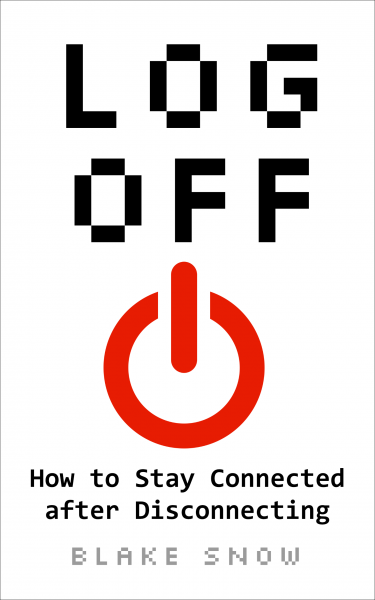 The self-help memoir and well-researched book is the first for Snow, a prolific writer for such publications as Wired, USA Today, CNN, and Wall Street Journal among others. The book produces convincing evidence and a path forward for people hoping to reclaim their offline lives without the constant distraction and “fear of missing out” caused by the internet, social media, and smartphones.
The self-help memoir and well-researched book is the first for Snow, a prolific writer for such publications as Wired, USA Today, CNN, and Wall Street Journal among others. The book produces convincing evidence and a path forward for people hoping to reclaim their offline lives without the constant distraction and “fear of missing out” caused by the internet, social media, and smartphones.
“With Facebook recently admitting as much, it’s official,” says Blake Snow, author of Log Off: How To Stay Connected After Disconnecting. “Excessive use of smartphones, the internet, and social media makes us miserable. Although I wrote this life-changing book for myself, I feel strongly that the ideas and encouragement contained therein can help others find greater fulfillment, peace of mind, and better relationships after responsibly logging off.”
In this quick but potent read, Snow recounts his own journey from being a workaholic internet addict, his awakening (aka “Montana Moment”), and the steps he has since taken to increase his facetime with actual people, do more offline with less online, double his productivity in half the time, and tunefully blend his analog and digital lives with no regrets. Continue reading…
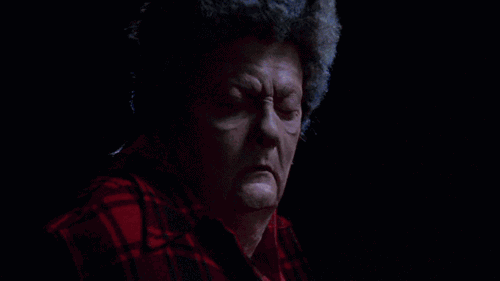
Warner Bros.
As seen on the Internet:
- How Mark Zuckerberg should give away $45 billion by Michael Hobbes. I cringe at the idea of telling other people how they should spend their money, but I’ll let it slide in this clever case as it tells the larger story of how philanthropy might change for the better.
- The creepiest thing that’s ever happened to me. This non-fiction story by Mark Blanchard about breaking down on the loneliest road in America with his girlfriend is not only incredibly written and told, but it’s a modern day mystery with a Pee-Wee’s big adventure like twist.
- The case for a bright American future. Living in fear is for Satanic people who watch too much news. The world is in good hands. Or so says the Oracle of Omaha.
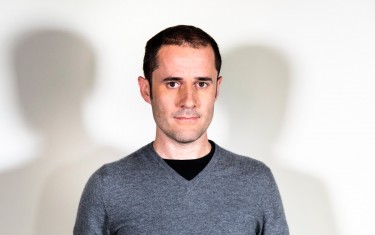
Andrew White/WIRED
Ev Williams believes the internet is “a giant machine designed to give people what they want.” In a speech reported by Wired, the co-inventor of Blogger and Twitter added, “We often think the internet enables us to do new things, but people just want to do the same things.”
For instance, we want to socialize, entertain ourselves, learn, and make work easier. The internet does all four better than any other convenience of the last century.
It does this in two ways, Williams explains. “Big hits on the internet (think Google, Facebook, Apple, Amazon) are masters at making things fast and not making people think… But the internet is not a utopian world. It’s like a lot of other technological revolutions.” Continue reading…
NBC/KSL—Like AOL before it, Facebook is the latest in a long line of mainstream technologies to introduce a lot of new users to the power, utility, and network effect of the Internet.
At the same time, the popular hangout has negatively impacted the number of public comments taking place online. Case in point: The number of people making online remarks has dwindled from a record 15% five years ago to an estimated 7% last year, according to market research by Nielson.
The reason: “Conversations around stories are moving off the news page and onto social networks,” says Steve Rubel, a longtime observer of social media since 2004. “With time spent on social networks like Facebook skyrocketing, it leaves little left to engage at the source of the news.”
Is that a problem? Continue reading…

… than whipping your phone out at the alter. “Nothing’s official,” she said, “until it’s Facebook official!”
True story. Incredibly stupid. But true. The bride even had a pocket on her dress to hold her phone.
We now have the attention span of flies.
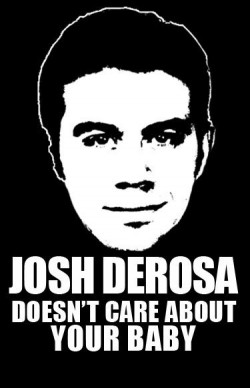
From one of the most brilliant minds of our time comes…
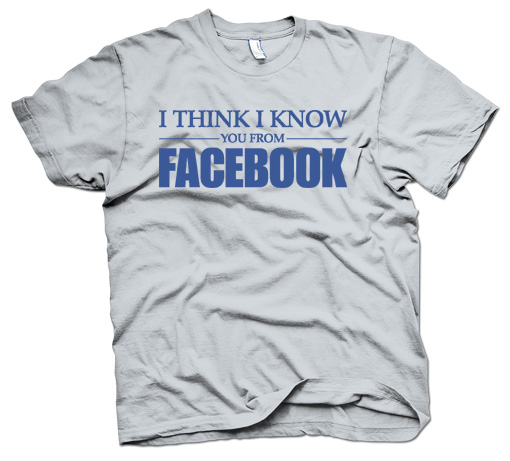 What he said.
What he said.
[youtube]http://www.youtube.com/watch?v=hq27k6njR40[/youtube]
Great version of Radiohead’s Creep, by the way.
See also: Did I just commit social suicide?
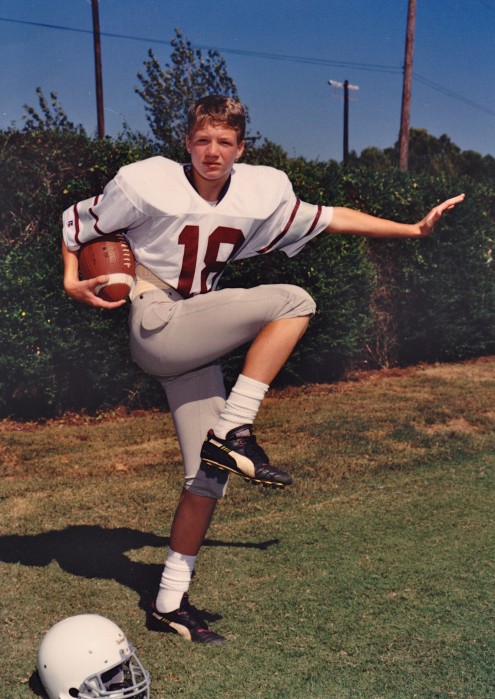
Photographer had me pose like that because I was a running back. Or at least I tried to be.
Fun fact: Those Puma “soccer” cleats are actually hand-me-downs from my older brother—an understandable side effect of growing up with five siblings.
Photo taken in 1993, after numerous bouts of Bull in the Ring. Image courtesy Cathy Snow (Hi, Mom!)
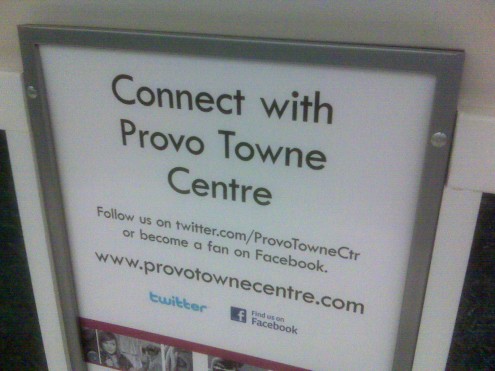
Because everyone wants to follow and friend a shopping mall. Way to think big, guys.
Written by Chicken Little of the Digital Age
Technology is making us stupid.
Don’t believe me? Read this story about how Apple is now tracking the exact location of iPhone users and sharing it with advertisers.
Or this one documenting numerous Facebook security holes.
Or how have slowly made themselves more vulnerable while broadcasting there whereabouts on Twitter (NOTE TO BURGLARS: When I message that I’m away from home, don’t believe me).
Or the mother of all “You’re freakin’ crazy” behavior: The whole idea behind Foursquare (aka willingly telling the world your precise location so marketers and predators could potentially exploit you.)
I’m not saying the above mentioned technologies aren’t without their advantages. Or that we should shun the use of such technology.
But our intimate relationships with many (if not all) of these technologies have gone too far. As a result, our privacy has been compromised. In many ways, we’ve become our own oppressors. Obsessive sharing might even have consequences on our freedom.
The good news is that much of this can be reversed by hitting the power button or delete button. Of course, you need to know where you’ve posted personal information online, including photos. Delete the ones that no longer (or never did) have any utility.
But most of all, be wary of publishing anything online you wouldn’t broadcast on your front lawn (including your blog).
Now back to regularly scheduled TMI…
DISCLOSURE: This post was written by a protective husband and father. (D’oh! I did it again.)
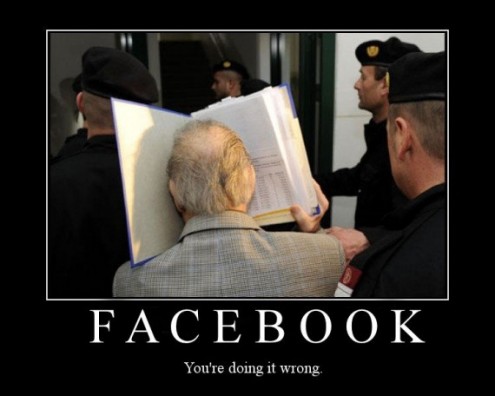
If there’s one thing this world isn’t short on, it’s attractive women. Seriously, mature females are the most aesthetically pleasing things to look at. Heck, even girls can’t keep their eyes of each other.
But there’s a big difference between appreciating beauty and lusting after it. Which is why some dudes are unfriending attractive females on Facebook, in an effort to stay Marriedbook (crash cymbal please).
“I deleted an old high-school girlfriend,” a colleague told me recently. “She was posting some pretty racy photos of hereself, and I realized I didn’t need to be seeing that as a married man.”
In similar shoes, I felt empowered upon hearing this. Indeed, before quitting Facebook, I had to remove a couple of contacts from my account for similar reasons. But it’s encouraging to hear other married men fighting to stay happily married. It gives me hope.
On that note, do you have any electronic relationships that need deleting?
Facebook is a great way to stay connected with friends. It’s also a great way to stay connected with people you wouldn’t have otherwise, resulting in added noise and unwanted drama. Which is why I deleted all my “friends” and updated my status to the following:
“Blake Snow is currently on Facebook hiatus. (Pretty cool, no?) If you’d like to get in touch—either by email, status updates, RSS, or his blog—please visit his website. Or just talk to him the next time you see him.”
Why hiatus instead of deletion? Because Facebook has more than 300 million members, so it seems insular of me to completely disregard it. As is, I have the option to resume my account, and I still benefit from redirected search traffic. Will I ever come back? That’s the great thing about being on hiatus—I can defer my decision indefinitely.
Any predictions on how this experiment might conclude? Social suicide? Professional setback? Or better productivity and greater independence?
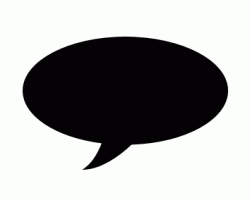 Five years ago this week, I launched Smooth Harold. Coolest blog evar! Since its launch, if one thing has changed the site more than anything else, it’s been Facebook.
Five years ago this week, I launched Smooth Harold. Coolest blog evar! Since its launch, if one thing has changed the site more than anything else, it’s been Facebook.
A quick glance at my front page reveals that not many people comment like they used to, even though traffic levels have remained the same. Since my blog is syndicated to my Facebook account, many readers prefer to comment there instead of here.
(Admittedly, I don’t post as much content as I used to, since Facebook is a superior way of bookmark sharing and pithy status updates.)
But maybe it isn’t just Facebook or Twitter that’s changed where people communicate online. Maybe the interest in the comment has waned. I remember when posting a comment was pretty fun. It was empowering. Now it’s almost blasé. And it’s annoying to skim through so many trolling comments. So commenting on Facebook, among trusted friends and family, ensures you don’t have to deal with the latter.
At the same time, I can recall numerous occasions where a complete stranger left an inspiring comment on my blog, something Facebook can’t offer (although Twitter can). So perhaps online commenting has become more insular, less democratic. At least on a personal level.
Or maybe it’s just me. Maybe I’m out of touch. (Is this thing on?)
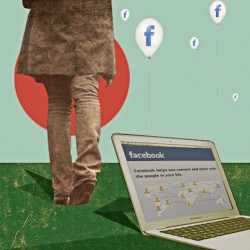 Facebook is a great way to stay connected with friends.
Facebook is a great way to stay connected with friends.
It’s also a great way to get fired, have your insurance benefits revoked, or suffer public humiliation. As a result, a number of users are deleting their accounts and leaving the popular networking site behind.
For good.
“It just became too much,” says grade-school buddy and long-time friend Josh Rhine. “More an obligation than fun. It also started to smell like some one cracked an egg of high school over an old gossip rag.”
Continue reading at VentureBeat…
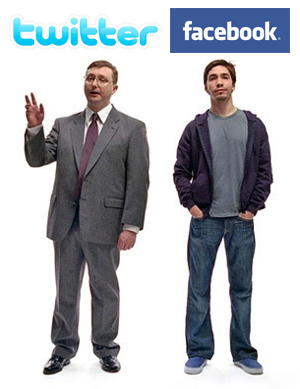 EDIT: I caved.
EDIT: I caved.
If you like status updates, but don’t want to invest time managing both a Facebook and Twitter account, here’s an easy way to make Status Updates act like Tweets:
- Login to Facebook and grab your Status feed by clicking here, then copy the “My Status” RSS URL, which can be found in the lower right corner of the page. Share the link with others.
- Optional: Login to Feedburner (if you haven’t already), enter the URL as a new feed, then activate “Buzz Boost” under the “Publicize” tab of your feed. Adjust settings to your liking.
- Optional: Copy your “BuzzBoost” HTML code, repaste on your blog, then share your link and subscription with others.
You could just sign up for a Twitter account and enjoy a few additional networking opportunities, but I don’t know a Tweeter who isn’t also a Facebooker. With 50 million strong, the same cannot be said of Facebookers. As a bonus, rolling your own status updates gives you greater control and lets you keep all your third-party social networking efforts in one consolidated place. Sweet!
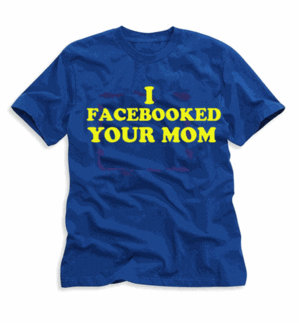 If you’re a Facebook user, you know how fun status updates can be. The good ones give you specific insight into what your friends are doing, how they are feeling, and what they really think. The bad ones are vague, cryptic, menial (you just checked into some hotel — no one cares), and wouldn’t know wit if it punched them in the baby maker.
If you’re a Facebook user, you know how fun status updates can be. The good ones give you specific insight into what your friends are doing, how they are feeling, and what they really think. The bad ones are vague, cryptic, menial (you just checked into some hotel — no one cares), and wouldn’t know wit if it punched them in the baby maker.
These, on the other hand, are much worse — 25 status updates you should never make on Facebook. Continue reading…
Rolling Stone has published a fascinating read on the origin’s of Facebook, which started as a Harvard student database in 2003 before quickly growing into the six most-visited website that it is today. The article examines the stories of four students who say Facebook creator Mark Zuckerberg stole their idea. From the article:
Continue reading…
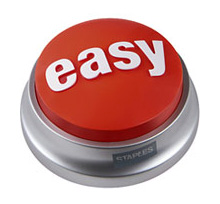 Every so often, when my technology gets out of hand, I trim fat to reduce unwanted noise — to simplify my life.
Every so often, when my technology gets out of hand, I trim fat to reduce unwanted noise — to simplify my life.
Last year, I put my RSS reader on a diet, going from over 400 subscriptions to just 67 (I’m down to 46 currently). This year I’m cutting two “unsociable” networks from my geek intake: LinkedIn, the high school year book of web professionals, and My Space, the new Hotmail of social networks.
LinkedIn is stale, lifeless, and has yielded zero fruit for me personally since first joining in 2004. So I’ve begun the archaic process of deleting my 90 connection account via email, as opposed to a simple button click and confirmation (I told you they were stale). I’ve heard the removal turnaround can take weeks. I’ll update if and when it happens.
Additionally, I’m deleting my unused My Space account after less than a year of membership. Sure it let me connect with old high school buddies, but the site is trashy and far inferior to Facebook.
So long, suckers.







 From one of the most brilliant minds of our time comes…
From one of the most brilliant minds of our time comes…



 Five years ago
Five years ago 
 EDIT:
EDIT:  If you’re a
If you’re a  Every so often, when my technology gets out of hand, I trim fat to reduce unwanted noise — to simplify my life.
Every so often, when my technology gets out of hand, I trim fat to reduce unwanted noise — to simplify my life.